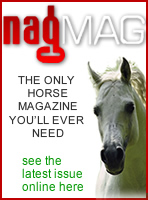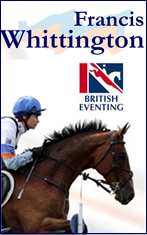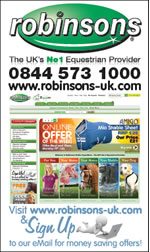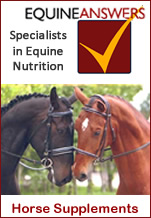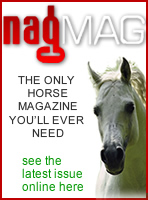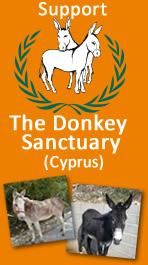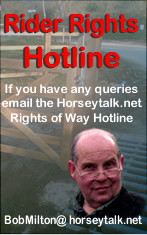
And photographs, if you have any.
Horseytalk.net Special Interview
Linda Parelli - on Dressage
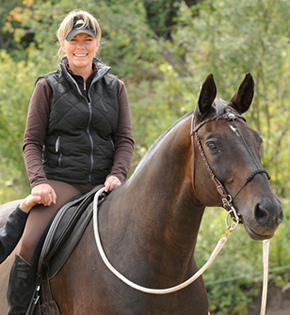 AS
Linda Parelli canters effortlessly around on her beloved
horse Remmer, spectators look on keen to find out more about
how she has trained the 17hh warmblood to such a high level,
sometimes riding bareback and without a bridle or simply
with a halter and rope. Read on to find out more about how
Linda has used Parelli techniques in her dressage training.........................
AS
Linda Parelli canters effortlessly around on her beloved
horse Remmer, spectators look on keen to find out more about
how she has trained the 17hh warmblood to such a high level,
sometimes riding bareback and without a bridle or simply
with a halter and rope. Read on to find out more about how
Linda has used Parelli techniques in her dressage training.........................
What is it about Parelli that would
help dressage riders?
You learn how to put the relationship with the horse first
- not just love your horse, but know what is important and
fulfilling or enjoyable for him too.
We learn to put our principles before our goals. We care
as much about him. You also learn how to communicate with
horses using their body language and typical interactions.
Most horses are subject to one-way directives, they don't
get to share or express themselves.
Parelli helps horse owners and riders to realize that there
is a foundation even below dressage basics (and dressage
is in itself a foundation for other disciplines, like jumping
for example). This foundation develops a horse mentally and
emotionally, increases their confidence, quality of response
and establishes a true bond between horse and human. It also
teaches them the basic skills on the ground and under saddle.
Parelli Natural Horsemanship gives you a deep understanding of horses and horse psychology so you know how to adjust your training according to their needs.
The foundation is very thorough, and most times when Pat has been called in to work with a top level horse that has 'lost it', he finds gaping holes in this foundation.
Never ending self improvement - is also what it takes to be a great dressage rider. You learn how to overcome difficulties, solve problems, take a fresh start, solve equestrian puzzles. You also learn that the horse can only be as good as you are. You become more mentally, emotionally and physically fit. This is way more than a horse training program!
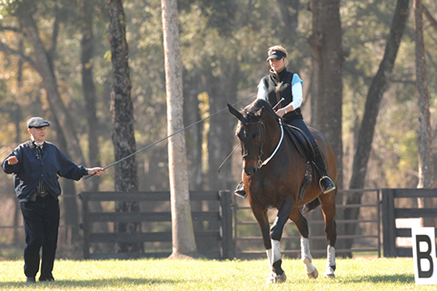 Dressage
is something that requires a lot of precision and can sometimes
cause a rider to become critical of their horse. Parelli
helps you learn how to balance that, to be particular without
being critical and how to keep your principles in front of
your goals for the horse's sake.
Dressage
is something that requires a lot of precision and can sometimes
cause a rider to become critical of their horse. Parelli
helps you learn how to balance that, to be particular without
being critical and how to keep your principles in front of
your goals for the horse's sake.
How does it fit with a competition mind-set - what are your views on dressage competition?
With dressage competitions the rider becomes more mentally and emotionally fit and not so nervous. They learn how to manage the horse's emotions too and to set themselves up for success.
You learn how to specialize without blowing the horse up and to prepare them properly way ahead of time.
Thanks to the use of equine psychology - you understand things from the horse's point of view and how to prepare - the perfect warm up for this horse or that horse, without wearing them down or burning them out.
Parelli teaches people to be non-predatory, and that if they get the fundamentals right the fancy stuff will follow. All too often we focus on the fancy stuff and the horse becomes too tense.
Anything is possible so long as we allow the horse to be in charge of the principles and the time line.
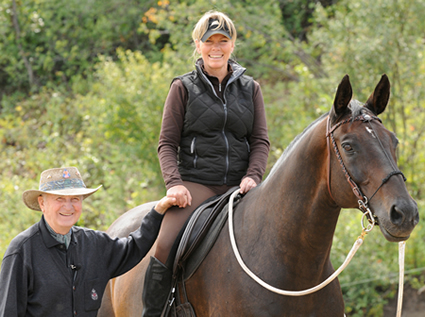 Competition
- competition isn't healthy, only healthy competition is
healthy! Win-win, the horse has to win too. When it's at
the expense of the horse's well being we don't approve. Horses
can be your perfect partner if you know how to cause that.
Competition
- competition isn't healthy, only healthy competition is
healthy! Win-win, the horse has to win too. When it's at
the expense of the horse's well being we don't approve. Horses
can be your perfect partner if you know how to cause that.
Discover the inner game of horsemanship / dressage - where it's about personal achievement, personal best and how much you can do with the horse instead of being the best of the worst that was there that day. Check your ego at the door! Parelli gives you a macho-ectomy.
When I was competing in Sydney my horse was nervous and often it was an awful, tense ride and yet I'd win. It didn't feel good to me and I know it didn't feel good to my horse. It was Pat who gave me the perspective on being the best of the worst that was there that day - I lost interest in that. I wanted it to be the best both me and my horse could do without nerves or external issues affecting us. I actually began the Parelli program while I was training and competing and my scores went up by more than 10% in the first two months.
What I love about coming back to dressage after all these
years living and teaching Parelli, is that it is fun. It
didn't used to be fun. I was so over-focused, in some ways
it was stressful and if not for me, I know my horse didn't
enjoy it. 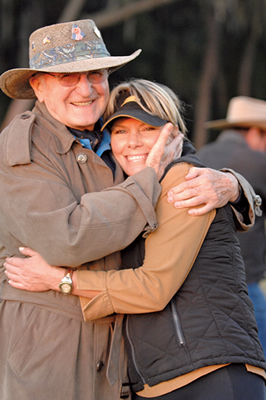 Now
my horse tries like crazy, and I feel his sense of accomplishment
and how he enjoys our harmony together. Dressage was always
so difficult and Walter Zettl has taught me how you can do
the most difficult manoeuvres and yet your horse shouldn't
even know they are difficult! It's all an extension of the
primary manoeuvres, even piaffe.
Now
my horse tries like crazy, and I feel his sense of accomplishment
and how he enjoys our harmony together. Dressage was always
so difficult and Walter Zettl has taught me how you can do
the most difficult manoeuvres and yet your horse shouldn't
even know they are difficult! It's all an extension of the
primary manoeuvres, even piaffe.
What are three simple things that dressage riders could do to incorporate Parelli techniques into their training?
Play the Seven Games on the ground with their horse instead of or in addition to lungeing, because circling is one of the Seven Games.
Lungeing may develop the horse's body, but the mind goes to pot. Mindless circles can make a horse dull or frustrate them. It does not make them calmer, smarter or braver.
The Seven Games develops a horse mentally, emotionally and physically. It develops their confidence, teaches them to think and solve problems, helps them to feel like a partner rather than a robot. Plus it prepares them for every single manoeuvre a dressage horse would ever need to do because one of the games, or a combination of them, can be found at the root of every movement, from transitions to lateral manoeuvres to piaffe.
1. Play with your horse on the ground to build a better relationship and fundamentals for performance / gymnastics.
2. Cross train - regardless of specialization, cross-training is an important balance, in this case it could be hacking out.
3. Taking care of behavioural issues, realizing they are not separate from your horsemanship / dressage endeavours. They are part of grooming the equine athlete inside and out.
Commonsense behaviours often become secondary to performance training. For example, many top equine athletes have trouble with trailer loading, spookiness, impulsiveness, are hard to shoe, scared of the vet, won't stand still to mount, hard to catch, can't be ridden on a loose rein, run off if given the chance, can't do anything "functional" such as ride outside or jump over something, cross a ditch, or be in the company of other horses, etc. They become hot-house flowers, or brain-dead robots - obedient without exuberance and dignity.
Dressage horses tend to be over-ridden with contact and in vertical flexion. This limits their vision and as result they can lose confidence and get spooky.
1. People think you shouldn't / cannot "play" with a performance horse. That you have to keep it serious. But to truly achieve harmony with horses you have to think about their needs, and 'play' is important to horses. Watch what they do with each other when turned loose together, then think about their life isolated in a stall. They need to play, and sometimes we are their only outlet. In Parelli we keep horses mentally and emotionally balanced by playing the same games with them that they play with each other (a little more constructively of course!) and that's the Seven Games. Pat Parelli identified these games by watching horses interact.
2. Pat Parelli teaches us to see things from the horse's point of view. We ask ourselves these questions every day: Imagine being your horse - How's your world? What do you think of your owner / rider / trainer? What do you think of your routine? Are you excited to see them turn up each day?
The more we want to achieve with your horse, the more we need to find out about what achieving a real bond, a real partnership involves. It by-passes all the performance horse problems that most people have learned to expect come with the territory. They are usually not behavioural problems, they are relationship problems. What else would you call it when your horse greets you with pinned ears or turning his back to you?
3. People are riding horses that are scared of them or that are arguing with them. That has to change in order for people to be safe, have fun and achieve their goals... with the horse on their side.
For further information contact Parelli UK on 0800 0234 813 or visit www.parelli.com
Buy your Parelli books in the Horsetalk Shop |
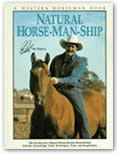 |
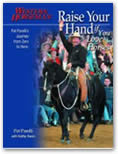 |
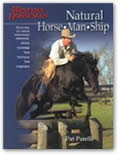 |
| Buy it here | Buy it here | Buy it here |

